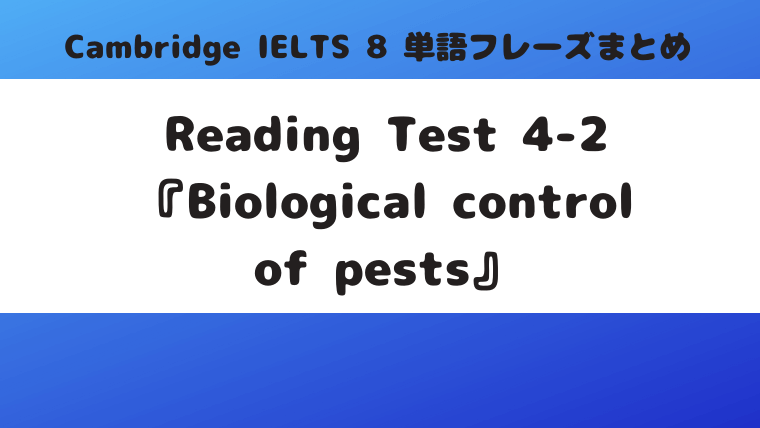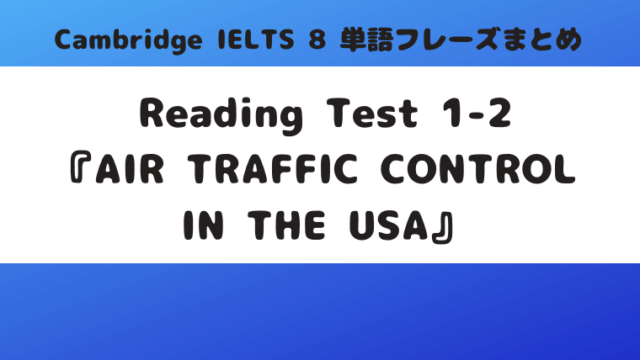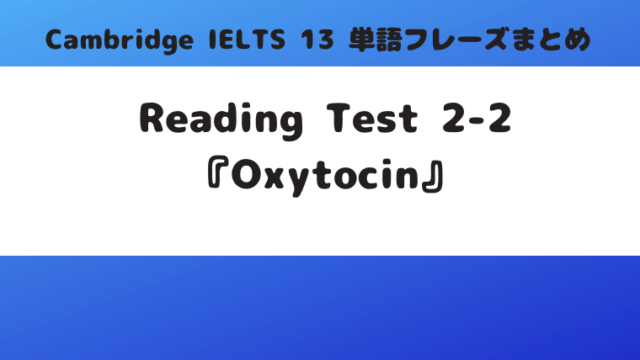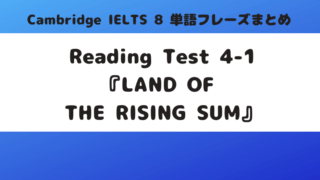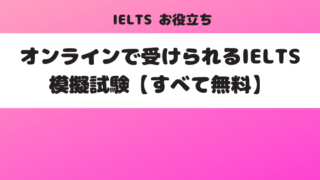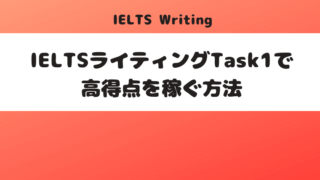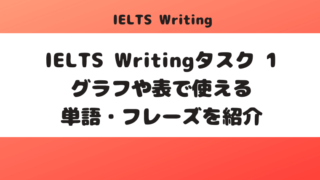「Cambridge IELTS 8」Reading Test 4-2『Biological control of pests』の単語・フレーズをまとめました。(p.93)
私がIELTS Readingの単語・まとめを行う理由は「Cambridge IELTS Reading単語・フレーズまとめ」からご覧ください。
Reading Passage 4-2:Biological control of pests
- reckless
adjective /ˈrek.ləs/
doing something dangerous and not worrying about the risks and the possible results
向こう見ずな, 無謀な
(実践IELTS英単語3500:1797) - synthetic chemicals
合成化学物質 - synthetic
adjective /sɪnˈθet.ɪk/
・Synthetic products are made from artificial substances, often copying a natural product:
・disapproving false or artificial:
(化学)合成の
(実践IELTS英単語3500:2579) - pose
verb /pəʊz/
・to cause something, especially a problem or difficulty:
・to ask a question, especially in a formal situation such as a meeting:
・to move into and stay in a particular position, in order to be photographed, painted, etc.:
・to pretend to be something that you are not or to have qualities that you do not have, in order to be admired or attract interest:
1 《他》 pose a danger / risk / hazard / threat
危険をもたらす
2 a) 《自》 (写真・絵画で) ポーズをとる
b) 《他》 <人> にポーズをとらせる, <写真> をポーズをとらせて撮る
3 《自》 英 気取る
(実践IELTS英単語3500:801) - apart from
…以外は, を除いて - engendering
verb /ɪnˈdʒen.dər/
to make people have a particular feeling or make a situation start to exist:
<感情など> を抱かせる, <問題など> を引き起こす
(実践IELTS英単語3500:3274) - pesticide
noun /ˈpes.tɪ.saɪd/
a chemical substance used to kill harmful insects, small animals, wild plants, and other unwanted organisms:
(害虫・害獣駆除用の) 殺虫剤, 農薬 → herbicide
(実践IELTS英単語3500:2776) - resistant
adjective /rɪˈzɪs.tənt/
・not wanting to accept something, especially changes or new ideas:
・not harmed or affected by something:
1 対抗力[耐性]のある
resistant to
2 抵抗する
resistant to
(実践IELTS英単語3500:2166) - lethal
adjective /ˈliː.θəl/
able to cause or causing death; extremely dangerous:
1 致死(性)の, 死を招く
2 危険な, 強烈な
(実践IELTS英単語3500:2614) - superbug
noun /ˈsuː.pə.bʌɡ/
a type of bacteria that causes an illness that cannot be cured by antibiotics
スーパー細菌(抗生物質でも殺せないバクテリアのこと) - immune
adjective /ɪˈmjuːn/
・protected against a particular disease by particular substances in the blood:
・not affected or upset by a particular type of behaviour or emotion:
・not able to be punished or damaged by something:
1 《名の前不可》 免疫を持った, 免疫のある
2 《名の前でのみ》 免疫…
3 《名の前不可》 immune to something
<…>に影響を受けない
4 《名の前不可》 immune from something
<…>を免れる, から保護される
(実践IELTS英単語3500:2539) - insecticide
noun /ɪnˈsek.tɪ.saɪd/
a chemical substance made and used for killing insects, especially those that eat plants
殺虫剤 → pesticide
(実践IELTS英単語3500:2776) - wipe out
wipe out [句動詞]
1 wipe something ↔ out <場所など>を全滅させる, <生物など>を絶滅させる, <思い出など>をぬぐい去る
2 wipe somebody out 〘インフォーマル〙 <人>をへとへと[くたくた]にさせる
3 wipe out 米 〘インフォーマル〙 (自転車・車などに乗っていて) 転ぶ, ぶつかる - in check
手の内にある;支配下にいる;コントロールされている - withstand
verb /wɪðˈstænd/
to be strong enough, or not be changed by something, or to oppose a person or thing successfully
1 <物が> <熱・圧力など> に耐える
2 <人などが> <苦境など> に耐える, 屈しない
(実践IELTS英単語3500:2287) - offspring
noun /ˈɒf.sprɪŋ/
・the young of an animal:
・humorous or formal a person’s children:
1 〘フォーマル〙 (動物の) 子, 子孫
2 〘フォーマル/ユーモラス〙 (人の) 子供
3 所産, 派生物
(実践IELTS英単語3500:1708) - havoc
noun /ˈhæv.ək/
confusion and lack of order, especially causing damage or trouble:
大混乱, 大損害
(実践IELTS英単語3500:2748) - bask
verb /bɑːsk/
to lie or sit enjoying the warmth especially of the sun:
1 日光浴する
2 bask in something
<恩恵・賛辞など>に浴する
3 bask in something
<場所などが> <日光など>に当たって暖まる
(実践IELTS英単語3500:3289) - avidly
熱心に
(実践IELTS英単語3500:3227) - proliferation
verb /prəˈlɪf.ər.eɪt/
to increase a lot and suddenly in number
1 《U, a/the ~》 〘フォーマル〙 (核兵器などの) 拡散, 急増
2 a proliferation of something
〘フォーマル〙 多数の<…>
3 《U, a/the ~》 〘専門〙 (細胞・芽などの) 増殖, 急成長 - outbreak
noun /ˈaʊt.breɪk/
a time when something suddenly begins, especially a disease or something else dangerous or unpleasant
(戦争などの) 勃発(ぼっぱつ), (疫病などの) 突発的な発生
(実践IELTS英単語3500:1704) - outlay
noun /ˈaʊt.leɪ/
an amount of money spent for a particular purpose, especially as a first investment in something:
(新たな事業・活動を始めるための) 費用, 経費, 資金
(実践IELTS英単語3500:3077) - invasion
noun /ɪnˈveɪ.ʒən/
・an occasion when an army or country uses force to enter and take control of another country:
・an occasion when a large number of people or things come to a place in an annoying and unwanted way:
・an action or process that affects someone’s life in an unpleasant and unwanted way:
1 《C, U》 侵略, 侵攻
2 《C》 殺到
(実践IELTS英単語3500:1102) - mutation
noun /mjuːˈteɪ.ʃən/
・the way in which genes change and produce permanent differences:
・a permanent change in an organism, or the changed organism itself:
1 突然変異
2 〘専門〙 母音変異 - adverse
adjective /ˈæd.vɜːs/
having a negative or harmful effect on something:
1 都合の悪い, 逆の
have an adverse effect on somebody / something
<…>に悪影響[逆効果]をもたらす
2 不利な, 不都合な
(実践IELTS英単語3500:2051) - peril
noun /ˈper.əl/
・great danger, or something that is very dangerous:
・do sth at your peril→to do something that might be very dangerous for you:
1 《U》 (命にかかわるような) 危険, 危難
in peril
危険にさらされて, 危機に陥って
2 《C通例複数形で》 (ある活動・状況における) 危険(な事), 難問
(実践IELTS英単語3500:1921) - perpetual
adjective /pəˈpetʃ.u.əl/
・continuing for ever in the same way:
・often repeated:
1 (いらだたせる事などが) のべつ幕なしの, ひっきりなしの
同意 constant
2 不断の, 絶え間ない
同意 constant
(実践IELTS英単語3500:2242) - detrimental
adjective /ˌdet.rɪˈmen.təl/ US /ˌdet.rəˈmen.t̬əl/ formal
causing harm or damage:
有害な, 不利益な
(実践IELTS英単語3500:3043) - disperse
verb [ I or T ] UK /dɪˈspɜːs/ US /dɪˈspɝːs/
to spread across or move away over a large area, or to make something do this:
1 a) 《自》 <群集・デモ参加者などが> 散り散りになる, 解散する
b) 《他》 …を追い散らす
2 a) 《自》 消え散る
b) 《他》 …を消え散らせる
3 《他》 〘専門〙 (物理学で) <光> を分光する
4 《他》 〘専門〙 (化学で) <粒子> を分散させる
(実践IELTS英単語3500:2823) - obnoxious
adjective /əbˈnɒk.ʃəs/
very unpleasant or rude
1 <人・発言などが> ひどく不愉快な, 鼻持ちならない
2 <においが> とても臭い
(実践IELTS英単語3500:3169) - devious
adjective /ˈdiː.vi.əs/
Devious people or plans and methods are dishonest, often in a complicated way, but often also clever and successful:
1 ずる賢い, 狡猾(こうかつ) な
2 《名の前でのみ》 〘フォーマル〙 (道・ルートが) 遠回りの, 曲がりくねった
(実践IELTS英単語3500:3054) - weevil
noun /ˈwiː.vəl/
any of various beetles that destroy crops such as grains and cotton
ゾウムシ ((穀物などを食べる害虫)) - hyacinth
noun /ˈhaɪ.ə.sɪnθ/
a pleasant-smelling plant with a lot of small flowers that grow close together around one thick stem
ヒヤシンス - nuisance
noun /ˈnjuː.səns/
・something or someone that annoys you or causes trouble for you:
・make a nuisance of yourself→to cause trouble or to annoy other people
1 《C通例単数形で》 迷惑な行為, 厄介な人[もの,こと]
2 《C, U》 〘法〙 不法妨害, (騒音などの) 公害
(実践IELTS英単語3500:1702) - parasite
noun /ˈpær.ə.saɪt/
・an animal or plant that lives on or in another animal or plant of a different type and feeds from it:
・disapproving a person who is lazy and lives by other people working, giving them money, etc
1 寄生植物[動物], 寄生虫
2 〘けなして〙 パラサイト, 寄生虫のような人
(実践IELTS英単語3500:2759) - defoliant
noun /ˌdiːˈfəʊ.li.ənt/
a chemical that is used to make the leaves drop off plants
枯れ葉剤 - press somebody / something into service
急場しのぎに<…>を利用する - plague
verb /pleɪɡ/ US /pleɪɡ/
・to cause worry, pain, or difficulty to someone or something over a period of time:
・to annoy someone, especially by asking repeated questions:
1 《U》 (the plague とも) ペスト, 黒死病
2 《C》 (一般に) 感染症, 疫病
3 《常に単数形で》 厄介もの, 病弊
4 a plague of rats / locusts / flies
ネズミ[バッタ,ハエ]の異常発生
(実践IELTS英単語3500:1796) - leaf-mining
虫が葉を食べていること - larval
幼虫
同意 grub
(実践IELTS英単語3500:2927) - forage
noun /ˈfɒr.ɪdʒ/
food grown for horses and farm animals:
1 《U》 飼料, 飼い葉
2 《常に単数形で》 英 捜す[あさる]こと, 物色, 食料集め[探し]
(実践IELTS英単語3500:3198) - beetle
noun /ˈbiː.təl/
an insect with a hard shell-like back:
カブトムシ
(実践IELTS英単語3500:1927)
